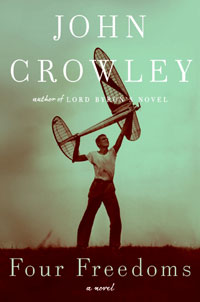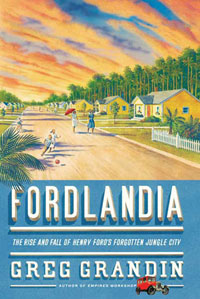American Utopia

If you have read novelist John Crowley's fiction (Endless Things and Little, Big), his new opus may come as something of a surprise--as his penchant is for what some refer to as slipstream or interstitial fiction.
Four Freedoms (William Morrow) is set in the early years of World War II (the worn-out phrase "back in the day" may actually apply here) and revolves around a sprawling aircraft bomber plant--the B-30 Pax (the largest bomber ever built)--and the community in the middle of Oklahoma that was created to support it. All manner of oddballs, drawn by a multitude of reasons and circumstances, end up at the Van Damme factory. Prosper Olander, the novel's disabled and protean protagonist, serves as the touchstone for Vi, Connie, and Dianne, women who have embarked on liberating and evolving paths that will radically alter America's social fabric. Crowley creates a quasi-utopian industrial organism with midgets, cripples, misfits, and women taking up the slack as American men ship off to a war. As the novel winds down, Pancho (is the name too obviously a literary reference?), Prosper's roommate and a malcontent of the progressive stripe, considers attending the United Nations conference held in San Francisco to reaffirm the Four Freedoms that President Roosevelt enunciated on January 6, 1941: freedom of speech, freedom of worship, freedom from want, and freedom from fear. Crowley's presentation of mid-century America is well and plausibly rendered (down to the price of condoms in 1944), though none more evocative than the mention of Sammy Cahn and Julie Styne's "It's Been a Long, Long Time." It's a pitch-perfect reference point for yet another transformational shift in America. Listen to June Christie croon and see if you don't agree.

The Van Damme brothers' attempt to socially engineer a cohesive industrial community at what was called Henryville brings to mind Henry Ford's ill-fated Fordlandia--his vision of recreating a Midwestern factory town in the Amazonian jungle. New York University mentor Greg Grandin ably assembles the details of Ford's grandiose failure in Fordlandia: The Rise and Fall of Henry Ford's Forgotten Jungle City (Metropolitan Books). In 1927, Ford's initial motive was to manufacture rubber for his automobiles on a plot of purchased land (which happened to be the size of Delaware)--but the plan apparently devolved into something more ambitious and impossible, and not one drop of rubber was ever produced that was used by Ford. Historian Susan Hecht properly credits Grandin as an author who "places the Ford story [within a] much broader social history of Amazonia, and rather than a saga of some novelty or the vanity of the rich, makes the resistance and the failure part of a larger Amazonian history rather than just the exotic ambitions of a man with too much money."
